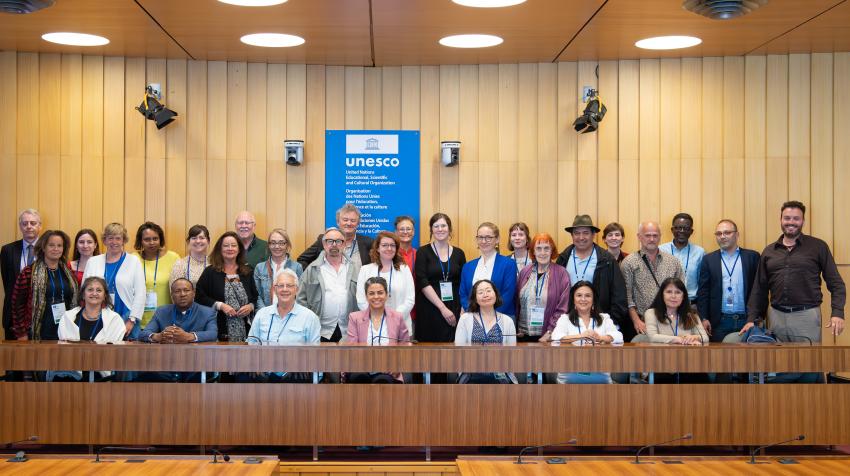December 2011, No. 4 Vol. XLVIII, 7 Billion People, 1 United Nations, Hand in Hands
In just over two decades, global health has gained a political visibility and status that some authors have called a political revolution. As health related issues have become a centre piece of the global agenda, significant resources in development aid have been made available to address major health problems. Global health has gained this political prominence because three agendas have reinforced one another in a variety of ways:
a security agenda driven by the fear of global pandemics or the intentional spread of disease, in an era where viruses have the potential to spread from one part of the world to another in a matter of hours;
an economic agenda, which is concerned not only with the economic impact of poor health on development or of pandemic outbreaks in the global marketplace, but increasingly considers the economic relevance of the health sector, in particular of certain industries, such as tobacco, food, and pharmaceuticals, and the growing global market of goods and services in relation to health;
a social justice agenda advocating health as a social value and human right, which includes action on the social determinants of health, access to medicines, support for the Millennium Development Goals (MDGs) relating to health, and the active engagement of philanthropies and civil society in a broad range of global health initiatives.
The global health agenda brings together two critical action spheres of our time: managing interdependence and globalization, and addressing the growing inequalities within and between nations through development strategies. It also lies at the intersection of many policy arenas and is subject to a special dynamic. On the one hand, poor health is frequently a consequence of other global crises such as finance, food insecurity, or climate change, while on the other hand, the whole of society bears the impact if health challenges are not well managed. Indeed, the economic consequences of governance failures in health, be they national or global, are significant; epidemics such as HIV/AIDS or disease outbreaks such as severe acute respiratory syndrome (SARS) or H1N1 influenza have proven this. Poor health will hinder development or destroy any development gains which were achieved through great effort. At present, this is best illustrated through The Global Economic Burden of Non-communicable Diseases (NCDs), a study prepared in 2011 by the World Economic Forum and the Harvard School of Public Health, which calculated that over the next 20 years, NCDs will cost more than $30 trillion, representing 48 per cent of the global GDP in 2010, thus pushing millions of people below the poverty line. This will result in a dramatic negative impact on the productivity and quality of life in many countries and regions of the world.
THE UNITED NATIONS AND HEALTH
A series of commitments, a wide range of international health policy instruments, new organizations and initiatives, as well as a broadening of the scope of health debates have marked efforts to improve health throughout the world over the past two decades. Many of these have emerged as a response to the increasingly complex global challenges defined by rising inequalities, epidemiological and demographic transitions, double disease burdens for many countries, unexpected natural disasters, such as the tsunami that occurred in Japan and the earthquake in Haiti, or the persistence of other threats, like the far-reaching consequences of the financial crisis.
In this context, the United Nations and its specialized agency for health, the World Health Organization (WHO), have played a crucial role by exercising its constitutional functions, in particular its convening power and its normative and standard-setting work. It has been fundamental to refer major global health issues to the United Nations General Assembly in order to underline that:
health must be considered an investment in both human and economic development;
health is a central building block in fighting poverty and in ensuring sustainable development;
health security and protection is the cornerstone of human security.
With the establishment of the Millennium Development Goals, following the Millennium Summit in 2000, came the first breakthrough -- the recognition of women's and children's health, as well as infectious diseases. In 2001, the UN General Assembly Special Session on HIV/AIDS stated in its Declaration of Commitment that "the global HIV/AIDS epidemic is a global emergency and one of the most formidable challenges to human life and dignity, as well as to the effective enjoyment of human rights". More recently, in 2011, the United Nations held the High-Level Meeting on Non- Communicable Diseases, which resulted in a political declaration and launched the Global Strategy for Women's and Children's Health.
HEALTH AT WHO
Despite significant funding problems, in recent decades WHO has worked towards the attainment of the highest possible standards of health in many ways, ranging from disease- specific programmes to overall efforts to strengthen health care systems based on primary health care. Many observers fail to realize that some of the most critical breakthroughs for global health have occurred as a result of the treaty-making power of the Organization, and through the strengthening of its normative role. Key examples include:
The WHO Framework Convention on Tobacco Control, the first international treaty negotiated under the auspices of WHO, was adopted in 2003 and entered into force in 2005. It has become one of the most rapidly and widely embraced treaties in United Nations history.
Since June 2007, states have been implementing the International Health Regulations adopted by the World Health Assembly in 2005. This legally-binding agreement provides a new framework for the coordination of the management of public health emergencies of international concern.
In 2011, WHO member States adopted the Pandemic Influenza Preparedness Framework, which brings together member States, industry, other key stakeholders, and WHO to implement a global approach to pandemic influenza preparedness and response, improve in the sharing of knowledge concerning influenza viruses with pandemic potential, and achieve more equitable access to life-saving vaccines and medicines.
In May 2010, WHO member States adopted the Global Code of Practice on the International Recruitment of Health Personnel to address the challenge of health worker migration, especially from low-income countries with already fragile health systems. It marked the first time in 30 years that WHO member States used the constitutional authority of the Organization to develop a code, following the adoption of the International Code of Marketing of Breast-milk Substitutes in 1981.
MONEY IS NOT ENOUGH
Global health is far more multifaceted than is often perceived, and requires more than development aid to achieve. In a global world, we need an integrated approach which includes action on social determinants, social protection, the support for major health care programmes at the local and country level, and the global agreements and commitments necessary to address the responsibilities and approaches of the many actors involved. One of the key challenges that global health faces at this point in time is the need to integrate the many laudable health initiatives which often run parallel to the health systems of the countries concerned. We still have a long way to go from the country ownership that was agreed upon in the 2005 Paris Declaration on Aid Effectiveness and the 2008 Accra Agenda for Action.
Too frequently, the global health debate is dominated by concentrating on the funding gap. For example, one calculation indicates that an extra $250 billion would be needed to reach the health MDGs over the next 5 to 10 years, of which $70 billion would come from donors. A much needed shift in perspective requires:
donors and countries to put more effort into developing domestic financing structures for health that are fair and sustainable;
national development strategies that counteract fragmented, short-term, and unpredictable aid for health;
social protection to be addressed with new urgency, as out-of-pocket payment for health care pushes people under the poverty line;
better use of the resources provided;
different sectors of government to work together to promote health nationally and internationally.
However, these remain difficult without the commitment and political will of the ruling elites. A case in point is the glob- al NCD challenge, which requires whole-of-government and whole-of-society approaches. Mounting evidence highlights how millions of deaths can be averted and economic losses reduced by billions; but progress requires action in many policy arenas, such as social policy, urban development, taxation, and education. Population-based measures for reducing tobacco and harmful alcohol use, as well as unhealthy diets and physical inactivity, are estimated to cost $2 billion per year for all low- and middle-income countries which, in fact, translates to less than $0.40 per person.
MORE VOICES FOR HEALTH -- MORE SKILLS TO NEGOTIATE
More actors want to have their voices heard on global health matters at the national and international level. The number of organizations active in health at the global level has increased considerably, and many of them are exploring innovative financing and governance models. Such new actors include the Global Fund to Fight AIDS, Tuberculosis and Malaria; the Joint United Nations Programme on HIV/ AIDS; and the GAVI Alliance. The Bill and Melinda Gates Foundation, and others like it, have changed the face of global health through significant financial contributions and a new approach to venture philanthropy, looking for innovation that supports the poorest. The private sector, first challenged by the UN Global Compact, has become active in new ways and is now involved in a myriad of health initiatives, including the United Nations debate on NCDs. A growing number of countries and regional organizations, such as the European Union, are developing an active stance in matters pertaining to global health. These new voices are heard during the debates on the reform of WHO, which is currently under way. They raise questions such as how can more stakeholders be involved? How can the voices of civil society be heard? How should the United Nations Organization deal with the private sector?
At the national level, the diversity of global health issues has gradually brought ministries of health, foreign affairs, security, economics, and development into a new dialogue. Global health today requires a skill mix of technical health knowledge, negotiating expertise, as well as awareness about geopolitical constellations, overlapping alliances, and trade and economic implications, to mention just a few. Some countries have begun to train negotiators in global health diplomacy and have introduced formal global health strategies to guide their actions in the global arena. This now includes not only WHO, but other international venues, such as the World Trade Organization, the Human Rights Council, and the Group of Twenty (G20) Finance Ministers and Central Bank Governors. The proposal of a financial transaction tax, for example, has long been on the agenda of health advocates in order to secure sustainable financing for health programmes.
Since 2008, the relationship between health and foreign policy is changing, as highlighted in the UN General Assembly resolution on Global Health and Foreign Policy. A group of foreign ministers have proposed that foreign policy apply a health lens, and that the protection of health interests should not necessarily be mutually exclusive with other core interests of countries. There are increasing opportunities where foreign policy interests can support health, and the initiatives by many emerging economies in South-South programmes are a good example of this. Finding mutually beneficial synergies between countries is critical in order to move the global health agenda forward.
THE INDISPENSABLE ROLE OF THE UNITED NATIONS
Global health deals with a wide range of concerns and tensions, not only between countries but between sectors, and between many different actors and interests. The growing complexity calls for better global health governance, including better coherence among multiple initiatives, clear distribution of responsibilities, and more transparency and accountability. The resulting debate revolves around key questions regarding where the leadership and authority on global health should lie, who should be involved, and what legitimate roles different actors could have, so that the potential of each of the diverse players can be utilized for the benefit of all. Who better to take on this challenge than the United Nations?
The UN Chronicle is not an official record. It is privileged to host senior United Nations officials as well as distinguished contributors from outside the United Nations system whose views are not necessarily those of the United Nations. Similarly, the boundaries and names shown, and the designations used, in maps or articles do not necessarily imply endorsement or acceptance by the United Nations.




